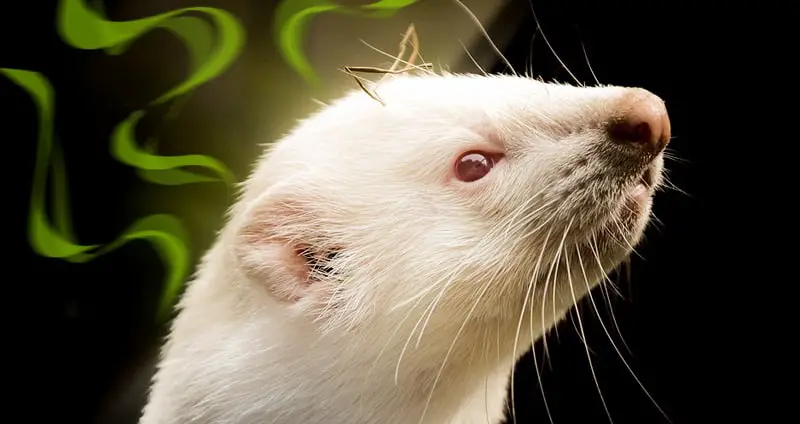Whether you own ferrets or not, the first thing that most people will say when you mention ferrets is “Oh, don’t they smell awful?”. You might even get the people that have encountered ferrets before telling you that they have experienced the stench first-hand. Unfortunately, these adorable creatures are plagued with society’s preconceived idea that they’re dirty and smelly little animals. Does this stereotype hold any weight, though? Are ferrets actually smelly, or is it all rumors and placebos?
Table of Contents
Do Ferrets Smell?
First, a very succinct answer. Do ferrets smell? Yes they do. However, do ferrets smell bad? That’s a bit of a different story.
Anyone that’s met ferrets will be quick to tell you that they do in fact have a specific scent to them. This scent isn’t a bad odor akin to an animal that hasn’t been washed or that lives in a filthy environment. Instead, it’s more of a musky or earthy smell that most people either quickly grow used to or don’t mind from the very start. Personally, the smell of a ferret has never bothered me; even at age 12 when I brought my first ferret home.
Now, the scent of an individual ferret can change drastically throughout their life due to factors such as age, health, diet, and environmental conditions. There’s also some things that you can do to influence your ferret’s scent and work to help them smell less musky.
It should be noted, though, that all ferrets will have a scent to them no matter what you do. As they’re a living animal, their musk is a part of their biology. Essentially all living animals have a scent to them — ferrets just have a scent that’s a bit more pronounced. Later on we’ll discuss how to drastically reduce the scent of a ferret. So, where exactly does this smell come from?
What Gives A Ferret Their Smell?
There are quite a few different factors that influence a ferret’s natural musk, and they all have to do with the ferret’s biology and their genetics. Ultimately, it comes to some glands within the ferret’s body — the anal glands and the scent glands in the skin.
To begin with, like all other carnivorous animals, ferrets have anal glands that are able to secrete a specific ferret scent. Ferrets are in the mustelid family — a family of animals that’s also inhabited by skunks, which are perhaps the “smelliest” animals that exist. These anal glands have two main functions, and those are territory marking and predator deterrent. If a ferret feels threatened, they may release a “stink bomb” and maybe a little bit of poop as a distraction.
Fortunately, ferrets that are well taken care of in safe environments will rarely empty these anal sacs, so that won’t contribute much to a ferret’s smell. A majority of ferrets sold in the United States are also de-scented by having their scent glands medically removed.The main source of a ferret’s scent comes from the scent glands in their skin. Ferrets have prominent scent glands up and down their back with a higher concentration of them near their rear end. These are the glands that secrete that natural ferret musk that’s naturally used as communication and familiarization in the wild.Males tend to have more prominent scent glands than females, and this is amplified during mating seasons if he hasn’t been neutered. Additionally, ferrets that are kept inside will have weaker scents than ferrets that spend a lot of time outside.
What Makes A Ferret Stink?
Now, there is quite a large and notable difference between a ferret that smells and a ferret that stinks. A smelly ferret is simply natural and due to their unique biology. However, a stinky ferret is due to several factors that owners can, indeed, control. If you’ve heard someone complain about how bad ferrets smell, it’s likely because they’ve encountered stinky ferrets in poorly-kept environments — something that’s entirely under the control of that ferret’s owner.
If you walk into a home with a ferret and it legitimately stinks, there’s two likely reasons for this that often go hand-in-hand. The first reason is a dirty ferret, and the second reason is a dirty cage. Both of these factors will definitely result in a ferret and house that stinks, not just one that smells like ferret musk.
Dirty Ferrets
First of all, ferrets can get dirty just like any animal. Most ferrets shouldn’t have many opportunities to get especially dirty if they’re kept inside, but it can definitely still happen. When your ferret gets excessively dirty, it’s recommended that you give them a minor wash to remove excess dirt and debris. We’ll elaborate a bit of ferret bathing in a second.
Additionally, cleaning the outside of a ferret’s ears with a Q-tip and specialty cleaner is a great way to get rid of wax that can also have a very musky odor.One more thing to note is a ferret’s diet! Ferrets are obligate carnivores, meaning that their bodies can only digest and process meat. If they’re getting a low-quality food or a food that contains a lot of additives, they won’t be able to digest this well. This will result in unhealthy poops that stink much worse than healthy poops. Even small snacks can have a big impact, so make sure that those occasional snacks are fine for a ferret to eat!
Dirty Cages
As ferrets aren’t necessarily the neatest animals, their cages can start to smell quite bad in a short amount of time. To begin with, ferrets poop several times a day. This results in a litter box that can quickly become full of poop and easily make an entire room reek. Ferrets can also track some of their litter around their cage, spreading out the source of the stench.
Ferrets also do quite a bit of sleeping throughout the day. This results in their bedding getting a lot of attention! Bedding that isn’t washed frequently will quickly start to smell overwhelmingly like ferrets — way beyond the basic musk of a ferret’s skin.
One more thing (definitely something that plagued me) that doesn’t have to do with cages is that some ferrets tend to poop around the house. If a ferret is out and about, they may not want to trek back to their cage. Instead, they’ll back into a corner and simply do their business, often times keeping it hidden for a decent amount of time. Even just one of these “poo mines” can result in quite an unpleasant odor in a room or house.
Keeping Ferrets & Their Cage Smelling Good
In order to keep your ferret from stinking and to prevent their musk from getting too strong, there are several things that you as the owner can do. By taking the time to properly do these few things below, you’ll keep your ferret and your home smelling great!
Clean Ferrets Are Happy Ferrets
The first point that needs to be addressed is bathing a ferret. This is something that should only be done about once or twice a year — only if a ferret is particularly dirty. The reasoning behind this is that frequent bathing will, surprisingly, make your ferret smell worse.
Ferrets have natural oils on them to help keep their skin and fur healthy. Bathing a ferret removes these oils, resulting in dry skin and a more brittle coat. Therefore, their glands will work overtime to replenish these oils, making a ferret’s natural musk much stronger.
You should always use specialty ferret products for grooming. This is because these products were designed with a ferret’s specific needs in mind. Recommended products are this shampoo and ear cleaner.
On top of very occasional bathing, ear maintenance is another effective strategy. Ferrets have ears that can get quite waxy and contribute to a ferret’s musky odor. So, about once or twice a month it’s recommended that you clean out your ferret’s ears. This is done by running a moistened Q-tip with specialty ear cleaner around the outer part of the ear. This will work to break down and remove most of the wax.
Effectively Cleaning Ferret Cages
Keeping a clean ferret cage is a relatively easy process that plays a big role in keeping your ferret’s environment smelling very clean. There are a few tasks that you’ll have to do daily and weekly that will make a world of difference with a ferret’s smell.To begin with, ferrets poop several times a day. This results in a litter box that can fill up quite quickly. You need to scoop your ferret’s litter box once or twice a day to remove this old poop and keep its smell from building up. It also helps if you purchase an odor-controlling ferret litter that has the ability to lock in odors for days at a time.Since ferrets sleep for more than half of the day, their bedding gets a lot of use! All of this sleeping will quickly result in beds, hammocks, and blankets that strongly smell of ferret. Fortunately, a weekly wash of all of your ferret’s bedding is enough to keep most of those smells at bay.
Finally, an entire wipe-down of the cage should be scheduled every month. This includes removing all things from the ferret cage, vacuuming up any spilled litter or food, and wiping down surfaces with harmless disinfectant wipes. You could also fill an old spray bottle with 50% vinegar and 50% water.
Give special attention to the sides and base of the litter box! Not only does this work to keep the cage smelling good, but it also makes it much safer for ferrets to live in.

